Poetry at the Indigenous Studies Conference
I survived the University of Hawai'i, Mānoa, Indigenous Studies Student Conference and all I got was a feeling of authenticity.
The conference fulfilled its theme, "Olo Nā Iwi (The Bones Lives): Indigenous Continuity," by presenting the myriad (and interdisciplinary) ways in which indigenous peoples continue to breathe, grow, learn, think, live, protest, flourish, gather, write, story, and sing.
The students were phenomenal; I feel so blessed to be teaching here. I also feel blessed that the Kamakakuokalani Center for Hawaiian Studies shared their halau with us over the weekend (shout out to Auntie Pua!):
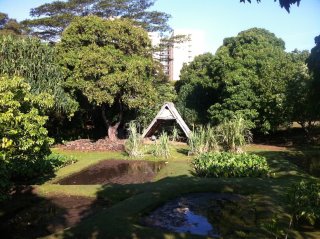
While there were many presentations that felt poetic (shout out to Hawaiian poet-scholars David Kealiʻi, Noʻu Revilla, and Marie Alohalani Brown), only one focused entirely on poetry: Lyz Sotoʻs "Spoken Words: A Poetic Space for Reclaiming Indigenous Identities." Lyz is not only a Ph.D. student in our English Department, but she is also the Executive Director of Youth Speaks, Hawaiʻi. Plus, Lyz is a phenomenal poet; check out her first book, Eulogies (2010), from Tinfish Press (shout out to editor Susan Schultz!).
Lyz's presentation explored the potential power of spoken word poetry to help indigenous youth reclaim, reconnect to, and articulate their identity. She made powerful connections to Pacific orality, testimony, and contemporary spoken word. To illustrate her point, Lyz showed a video of Team Guahan performing at Brave New Voices (shout out to the two talented poets Ryan Leon Guerrero & Walla Wai):
Brave New Voices 2011 Team Guahan
Another graduate student in our department, Hawaiian writer Donovan Kuhio Colleps, performed several amazing poems at the conference. He wove a kind of innonative-lyric-docu-poetry about his family, which left many in the audience in tears.
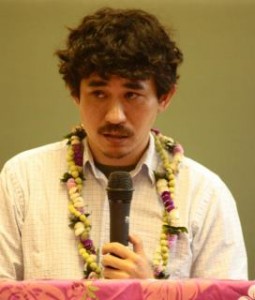
The keynote speakers for the conference were poets Mahealani Perez-Wendt, Chantal Spitz, and Allison Adelle Hedge Coke.
It was a pleasure to hear Mahealani read for the first time. I taught poem from her book Uluhaimalama (2008) in my Pacific literature course last semester, and it was great to hear the poems come alive in her voice. Her wonderful book was published by Kuleana ‘Ōiwi, a press dedicated to publishing Native Hawaiian writing (shout out to ku'ualoha ho'omanawanui!). In addition to being a poet, Mahealani is also a lawyer and activist:
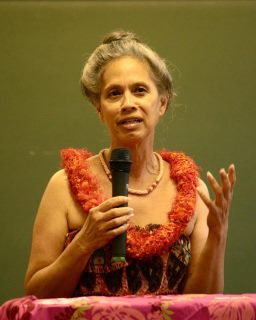
The next keynote speaker was Chantal Spitz, one of the most famous Ma'ohi (native Tahitian) writers. I taught her novel, Island of Shattered Dreams (shout out to the translator Jean Anderson!), in my Pacific literature course this semester. For her keynote speech, Chantal read a very powerful essay about colonialism in Tahiti (from nuclear testing to linguistic genocide) and the ability of writing to heal and empower. Even though it wasn't poetry, I mention it here because she read it as if it were poetry:
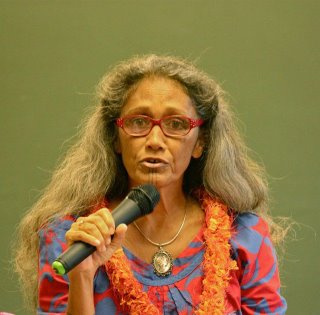
The final keynote was Allison Adelle Hedge Coke. She gave a very moving reading from her book Blood Run. She shared about her experience as an activist utilizing the power of poetry during public testimony against the desecration of native bones. This resonated with many in the audience because a prominent theme during the conference was the desecration and removal of ancestral Hawaiian bones (shout out to Sunny Greer and Makawalu!). Here's a pic of Allison holding a copy of SING: POETRY FROM THE INDIGENOUS AMERICAS.
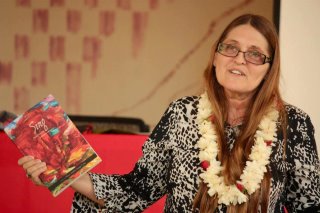
Three young Hawaiian writers read with Allison. Kaleionaona Lyman is currently a student in my Intro to Creative Writing course. He is a very talented young writer who is able to write in both Hawaiian and English, and his stories are deeply rooted in his culture and history. One thing I wanted to share about Kaleionaona is that (at the risk of sounding essentialist) he is very Hawaiian. When I tried to get him to send me a short bio, he wrote: "Haha, iʻm really sorry Professor, it kept slipping my mind: being that it is such a foreign way of writing to me, and moreover, that I could never find an "achievement" that I attributed solely to myself alone." Too awesome:
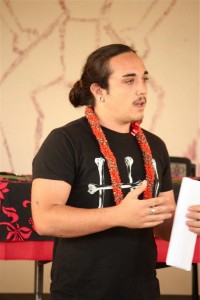
The other two young writers happen to be young, organic farmers. The first, Shea-Lah Kama, performed a very powerful poem in Hawaiian, and she spoke to the encroaching developments that threaten the agricultural lands in her community. I was very moved to see such a young poet who deeply believes in the power of words to fight for what she believes in. I was also very happy to learn that she will be studying at U of Hawai'i this coming Fall! I hope she is in one of my classes:
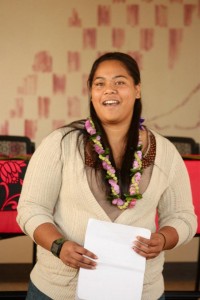
The second, U'ilani Arasato, performed a poem about being a farmer. I love that U'ilani not only writes about her love for her ancestral land, but she also lives it in her everyday life as a young farmer. U'ilani has also performed her work at public hearings, exhibiting again the relationship between poetry, testimony, and activism. Such passion for such a young poet! p.s. don't mess with young Pacific poets:
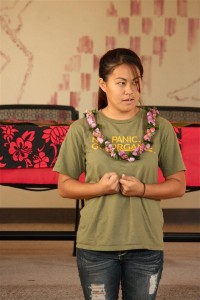
As a bonus, someone in the audience actually recorded U'ilani perform. I can't figure out how to embed the video, but you can link to it here. (the poem starts at about the 50 second mark).
Shout out to Hawaiian poet-scholar Brandy Nalani McDougall for organizing such an inspiring conference! She even thought to make sure that the university bookstore set up a table of books written by the keynote speakers and some indigenous faculty.
What are you waiting for--go buy some books right now because haven't you heard we're supposed to be vanishing.
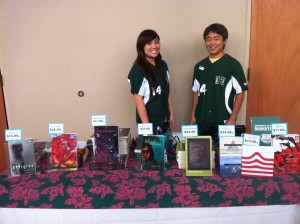
NOTE: ALL PHOTOS (except the first and last) WERE TAKEN BY MARIE ALOHALANI BROWN.
Craig Santos Perez is a native Chamoru (Chamorro) from the Pacific Island of Guåhan/Guam. He is the ...
Read Full Biography

